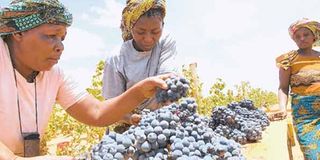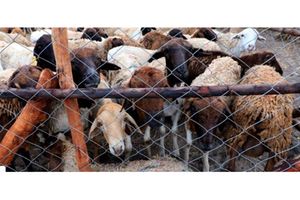Joy as Dodoma evolves into commercial hub

What you need to know:
The long-standing fallacy that Dodoma is semi-arid and cannot be economically viable has dwarfed the region’s progress for many decades.
Dodoma. Located in the centre of the country, Dodoma, the country’s capital, has suffered the consequences of unsubstantiated and misleading notions, leaving it trail other regions in terms of development.
The long-standing fallacy that Dodoma is semi-arid and cannot be economically viable has dwarfed the region’s progress for many decades.
For many, Dodoma is not a place to invest.
However, Dodoma residents can finally breathe a sigh of relief as the 2,669-square kilometre region evolves into an important commercial hub.
The notions have forced the region’s economy to depend on small-scale businesses and pastoralism only. These activities have failed to turn around the famers’ fortunes due to insufficient rains.
Poor technology and unfriendly climate have forced the formers to resort to subsistence agriculture.
Only half of the 2,699,217 hectares of the arable land has been cultivated.
The collapse of a few industries that were in the region also dealt Dodoma’s economy a huge blow.
Among the industries that collapsed include Dodoma Wine Company (Dowico), Quality Form Limited (Qfl) and Fahari Bottlers.
This is means that from there on, Dodoma’s economy has largely banked on products like charcoal, groundnuts, grapes, wheat and sunflower, whereby the majority of petty traders sell culinary items, with a handful engaged in wholesale shops, hardware, food and drinks businesses.
The poor economic trends have scared key local and foreign investors to invest in Dodoma, thinking that the region would have nothing good to offer them back.
However, at present, the region is mushrooming with several small-scale industries largely based on the production of sunflower cooking oil, wine, peanut butter, baobab oil, loaves of bread, fresh and condensed milk, fresh water and honey products.
However, these industries are still underperforming due to shortage of capital to engage in large-scale production. Their marketing scope is still low.
According to statistics available at the regional commissioner’s office, by 2010 the region’s GDP stood at Sh1, 024,651, and climbed to Sh1, 385,962 by 2012. The regions’ per capita, which was Sh485, 211 in 2010 grew to Sh665, 180 only in 2012.
According to a report of the Agency of Statistics, an average gross for Dodoma Region for the year 2009, at the current price, was Sh457, 375 million.
This output increased by 29.94 per cent from Sh351, 998 million in 2004. Dodoma has continued to contribute to the GDP by an average of 3.11 per cent.
But thanks to President John Magufuli, for his decision of shifting the government from Dar es Salaam to the designated capital city, which promised a drastic of fortunes.
With just some months away since the government started relocating to Dodoma, the region has witnessed major reforms in its economic sector, especially on the side of industrial investment.
Wine and Juice industries
Despite being the main producer of wine and table grapes, Dodoma had very few wine and grape juice processing factories. The situation prompted grape growers to market their product to Kenyan traders at low prices with others selling their grapes on the streets.
However, the grape growers must all punch the air in celebration due to on-going processes for establishing two major wine plants in Chamwino and Bahi districts.
In Chamwino District, the government has entered into a contract with the Tanzania Investment Bank (TIB), Government Employees Pension Funds (GPF) and Workers Compensation Funds (CWF) for the establishment of the Sh15billion worth grape industry.
According to Chamwino District’s Agricultural Officer, Mr Godfrey Mnyamale, the envisaged 15-acres ultra-modern processing industry will focus on the production of grape juice, concentrate powder, bulk wine, and grapes products.
“This major factory would possibly revive grape cultivation and provide employment to a lot of youths in the region, which in turn, will boost the region’s economy. There are hundreds of hectares of grapes here, but farmers were not fully engaged in cultivating the crop because of an unreliable market,” he said.
Moreover, in Bahi District, TIB and Unity Trust of Tanzania (UTT) have dished out Sh2.6 billion for supporting 170 acres of modern farms, and the bank plans to inject Sh729.5million in the farm for the establishment of a wine processing plant in Lamaiti area.
Sugar and leather factories
The European Union (EU) and the Institute of Rural Development Planning (IRDP-Mipango) are in preliminary stages of opening a Sh200million-leather processing factory in Chamwino District, which would supplement the government’s fight against poverty.
The project is under phase II of the parent project called ‘Adaptation of Climate Change (Eco-Act Project) in Central Tanzania’ as it will be implemented under the auspices of the EU.
When launching the National Five-Year Development Plan (NFYDP 2016/17-2020/21) in the region, the Finance and Planning minister, Philip Mpango, said the government was also planning to open a leather industry in the region.
In additional to the initiative, an Indian investor, Purandare Industries Tanzania Ltd, is also set to put a big sugar factory in Dabalo ward, Chamwino District.
The firm has so far entered into a contract with 102 farmers within the district to grow sugar cane for the factory’s raw materials at an estimated 1,167 acres of land.
Maize and sunflower factories
Recently, the Deputy Minister for State in the Prime Minister’s Office responsible for Policy, Parliamentary Affairs, Labour, Employment, Youth and the Disabled, Mr Anthony Mavunde, revealed to The Citizen good news that the state is in the process of opening up big sunflower and maize processing plants here.
He said the construction of the two industries would be completed in November, this year, adding that the government was determined to start more factories in Dodoma.
Construction of a dry port
The on-going construction of a dry port and a commercial hub in Dodoma is another step that will add major value to the region’s economic sphere.
The modern dry port to be constructed at Ihumwa at a cost of Sh100 million will certainly stimulate commercial activities in the capital city.
An architectural design and a feasibility study for the vast project have already been carried out by the ministry of Works, Transport and Communications.
The completion of the crucial project will probably turn Dodoma into a middle gateway of various cargoes to and from various destinations within and outside the country.
Apparently, the envisaged standard gauge railway from Dar es Salaam via Morogoro to Dodoma, is viewed as another stride that will spur Dodoma’s economy to new heights.
Besides, the Msalato International Airport would also play a crucial role in boosting socioeconomic development in the country’s administrative town.
Following the President Magufuli’s decision to disband the Capital Development Authority (CDA), over 10 local and foreign investors have so far filled in applications for land.




